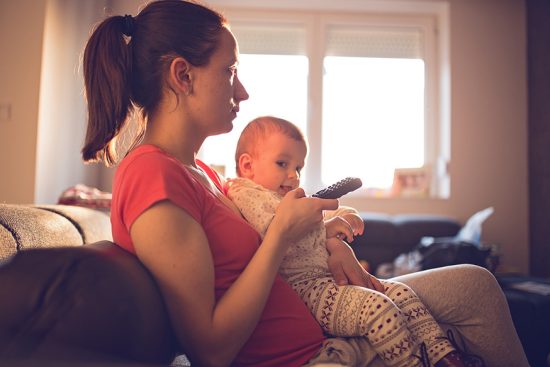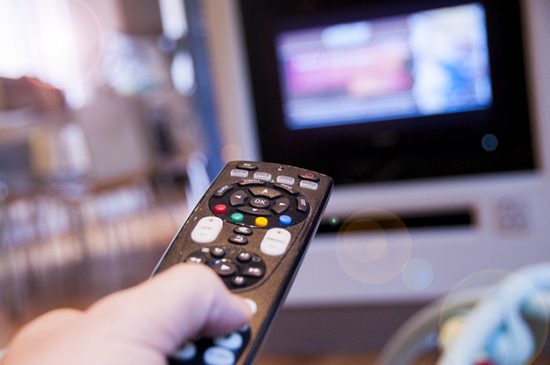What do we think of the mums we see on the small screen? Find out how mums feel about their TV alter egos.

We catch up with Rebecca Feasey, a Senior Lecturer in Film and Media Communications at Bath Spa University, about her fascinating research into how women feel about mums depicted on TV. Which mums do we relate to and who would we like to see more of?
Although the mums who took part in my questionnaire, which included NCT mums, could have chosen from a large number of mums from different genres and time periods, the favourites could be counted on one hand.

The majority of women who commented on a favourite maternal image pointed to Tess Daly or Holly Willoughby, because they were associated with a maternal role and wider domestic context, but not limited by it.
In this same way, the majority of participants spoke with fondness about sitcom characters such as Marge (The Simpsons), Lois (Malcolm in the Middle), Sue (Outnumbered) and Claire (Modern Family) because they were seen as mothers first and foremost, but this was not to suggest that they were solely defined by their maternal role.
Most TV viewing mums tended to judge those mums they saw on screen. The few TV viewing mums who didn’t said it was because they were all too aware of the emotional, physical and psychological difficulties associated with motherhood. They understood that we are all prone to make mistakes.
The results revealed a lack of good maternal role models on TV
That said, the majority of mums who watch TV spoke of the negative and problematic maternal figures that they saw ‘dominating’ the box. Many of them made the point that ‘bad’ mothers were so common that they struggled to think beyond these negative depictions.
One mother assumed that she was simply unable to recall a positive or favourite maternal figure because of her limited viewing time. She said: “I am not sure I watch enough television to be able to answer your questions very well, as I have struggled to think of nice mums I have seen and I am sure there must be some!”
Others made it clear that irrespective of time spent watching TV, there are few likeable or relatable images to be found.
Mums in the audience made the point that they judged those maternal figures who put their social and sexual desires before their children’s emotional needs. This was the case in both soap operas and reality programmes.

However, they also acknowledged that in many cases they felt compassion for the struggles that some of these mums faced in bringing up their children.
And yet, while many women found these struggling mums problematic figures, many women found the romanticised ‘ideal mother’ a fascinating yet frustrating figure to watch.
Watching ‘bad’ mothers on TV in turbulent domestic situations gives us a sense of comfort because the extreme and exaggerated behaviors allow us a critical distance from our own parenting practices. But watching perfect figures also encourages us to question our own maternal role.
It would seem that irrespective of the multi-channel, 24 hour television environment, very few mums on screen appeal to mums in the audience, which speaks of a lack of likeable or relatable mothers on TV.

Mums told me time and again that they struggle to see their lived experiences played out in the media, which continues to be a cause of concern, and a missed opportunity for public service and commercial channels alike.
Mums in the audience felt that there were very few maternal characters that they could relate to. The reason for this was that those women who were routinely seen on our TV screens were often maternal extremes.
These might be the struggling working-class teen mum or the romanticised middle class professional caregiver. In short, only a narrow version of motherhood seems to be presented.
The overwhelming majority of mums spoke of their frustration at the lack of realistic representations and their desire for more diversity in relation to the maternal stereotypes that are currently on TV.
These women noted an under-representation of foster and adoptive mothers, disabled and lesbian mothers, maternal cultural diversity and what they termed the ‘ordinary’ stay-at-home figure. These audiences spoke of their desire to watch a more diverse, complex and character-driven range of mothers …but is anyone listening?
If you’re interested in the topic of mums in the media, you could take a look at the books below:
Representations of Motherhood by Donna Bassin, Yale University Press (2009)
The Mommy Myth: The Idealisation of Motherhood and How It Has Undermined All Women by Susan Douglas and Meredith Michaels, Free Press (2005)
Mothers on Mothers: Maternal Readings of Popular Television by Rebecca Feasey, Peter Lang (2016)
From Happy Homemaker to Desperate Housewives: Motherhood and Popular Television by Rebecca Feasey, Anthem Press (2012)
Motherhood and Representation: The Mother in Popular Culture and Melodrama: Feminism, Psychoanalysis and the Material American Melodrama by E.Ann Kaplan, Routledge (1992)
Myths of Motherhood: How Culture Reinvents the Good Mother by Shari Thurer, Penguin (1995)